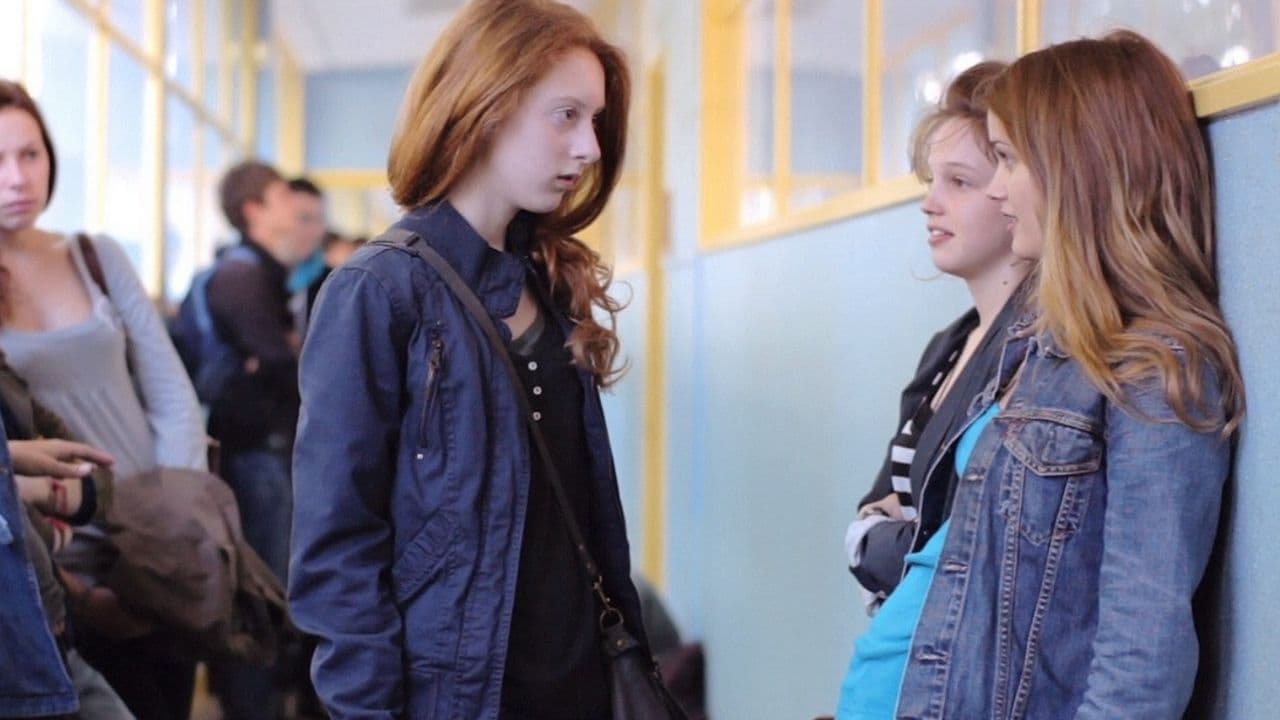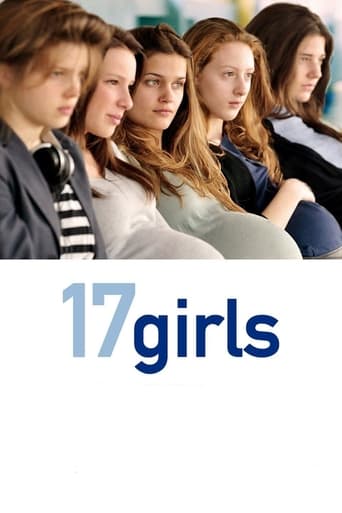Harockerce
What a beautiful movie!
BlazeLime
Strong and Moving!
Lachlan Coulson
This is a gorgeous movie made by a gorgeous spirit.
Quiet Muffin
This movie tries so hard to be funny, yet it falls flat every time. Just another example of recycled ideas repackaged with women in an attempt to appeal to a certain audience.
Kelly Kelly
The movie was told from the point of view of the teenage girls who all get pregnant all around the same time (Camille is the first, and it focuses on her). If in the end the girls said "Wow were we dumb!" It wouldn't work. Thats not the mindset of the girls. And it purposely ended like that to show that without Camille, their dream of creating a community quickly slipped away.The movie wasn't meant to show how illogical the girls were. It was to just show, from the girls perspective, why they wanted to do it. And the fact that they never really grasped what that meant for the rest of their lives adds to why they all made this pregnancy pact. I think this was refreshing, because in other film adaptations of what happened (Yes, this is a real event), they try to show how the girls were wrong in the end. But I think this movie offered both sides, and left you to decide if their decision was right or wrong. I think this movie could have gone a little more in-depth with their characters, like Camille, or maybe Clem, but overall I think it was a good representation of mob-mentality and rebellion among teenagers.
secondtake
17 Girls (2011)Lots of mid-teen girl stuff on French beaches. And yet supposedly a social issue movie about a rash of intentional pregnancies at a high school. There are scenes between the girls that pry into contemporary youth culture but only get the lid off. This is a sensational idea with the depth of a single gasp.Even stranger, once you get into it, is how the movie makers, the writer/director pair Delphine and Muriel Coulin (both did both), took an American high school news story and adapted it to this small industrial coastal city in France. It doesn't right true. The utter rebellion of the kids to reason, their various trajectories around peer pressure and media hype, and the general glibness of some of the school reactions all seem a bit callous, and without nuance. There is an attempt at depth (and some of the best acting) though the main character, Camille, played by Louise Grinberg. Here the need for such rebellion seems to have roots in her psyche and her family situation. How this effect "spreads" and becomes an easy viral sense of irresponsibility is not given much thought, however. There are three or four other girls who are given some complexity, but not enough to quite explain their motiviations.Maybe the project was doomed when the writers faced the central problem—this is both about a large effect (over a dozen girls, en masse) and an individual problem (one by one). How to do both? Especially when it happens pretty much simultaneously.There is a low budget documentary on the real deal—"The Gloucester 18" which is apparently (from their press kit) a kind of public service piece against teen pregnancy— and there is a TV series in Spanish called "El Pacto" that supposedly expands on the sensational aspects of the story. I'm not sure any of it is worth the trouble more than just reading a new article about the phenomenon. The movie here is curious at first, slow to get going, and has a few interesting moments, but it hardly holds up over an hour and a half.
pc95
Usually I like French movies, and so it is with some disappointment when I write this quick thrashing of "17 Girls" directed by sisters Delphine and Muriel Coulin. The storyline and cinematography are standard fare, with some montage grunge/rock music cuts I didn't care for, but the real problem lies with the intended message. Girls in groups, and in general mob mentalities for people, always seems to bring out the depths of stupidity and utter dumbness. So the directors instead of focusing on the pitfalls and problems of what happened show it as an exciting life- shattering bonding event. Indeed they even throw in the last lines of the movie with something to the effect of the girls took power into their own hands to "dream". This is sad and reprehensible drivel. Poverty and over-population are real problems. This sort of thing is exactly why I've heard people bring up the idea of licensed partenthood. Pregnancy is not some game, and it certainly not some feminist statement. How low directors can stoop ...
Framescourer
There's something irrefutably Gallic about this arresting rite-of- passage movie. When social maypole Camille falls pregnant at her French high school, her friends and other hangers-on take it upon themselves to get pregnant too. The film focuses on the girls and the dynamics of their relationships in this novel situation. What's so French about it though is that no-one seems to be able to get to the bottom of why this has come to pass. Despite plenty of dialogue bouncing off the topic the only real causal suggestion comes in the repeated - and silent - sequences of shots which observe the girls' bodies and frame the girls in their provincial bedrooms, staring into space, bored or dreaming. It's like Sofia Coppola's Virgin Suicides, with all the generational disconnect, and birth substituted for death.Dreaming is the key, a word which appears in the poetic pay-off voice-over line at the close. With little on offer in the town, the girls look to create their future for themselves in this radical way. As it is with young people in this country, there is little thought given to the practical ramifications of the birth, the '18 years of sacrifice' that Camille's mother refers to, berating her headstrong daughter. Instead the girls cling do their legal research - how to wrest themselves from parental control and the state's financial obligations - and cling to one another for the rest.It's a well-observed, often touching film in which the Coulin sisters manage a consistent tension. It's the tension of the vacuum around young people making demands for money, which come with too few or too heavy a burden of responsibility attached. I enjoyed the inclusion of Camille's brother, a soldier whose dreams are mortgaged to the state that has sent him to war. In a dreadful, subtle scene we see photos of his mascot teddy, a childish toy, propped up against the guns as if firing them.An absorbing, realist film that would stand up well in a double feature against the melodrama of Romain Gavras' Our Day Will Come (2010). 6/10

